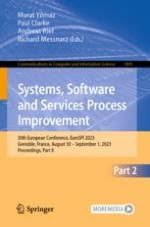2023 | OriginalPaper | Buchkapitel
Emerging Technologies Enabling the Transition Toward a Sustainable and Circular Economy: The 4R Sustainability Framework
verfasst von : Dimitrios Siakas, Georgios Lampropoulos, Harjinder Rahanu, Elli Georgiadou, Kerstin Siakas
Erschienen in: Systems, Software and Services Process Improvement
Verlag: Springer Nature Switzerland
Aktivieren Sie unsere intelligente Suche, um passende Fachinhalte oder Patente zu finden.
Wählen Sie Textabschnitte aus um mit Künstlicher Intelligenz passenden Patente zu finden. powered by
Markieren Sie Textabschnitte, um KI-gestützt weitere passende Inhalte zu finden. powered by
